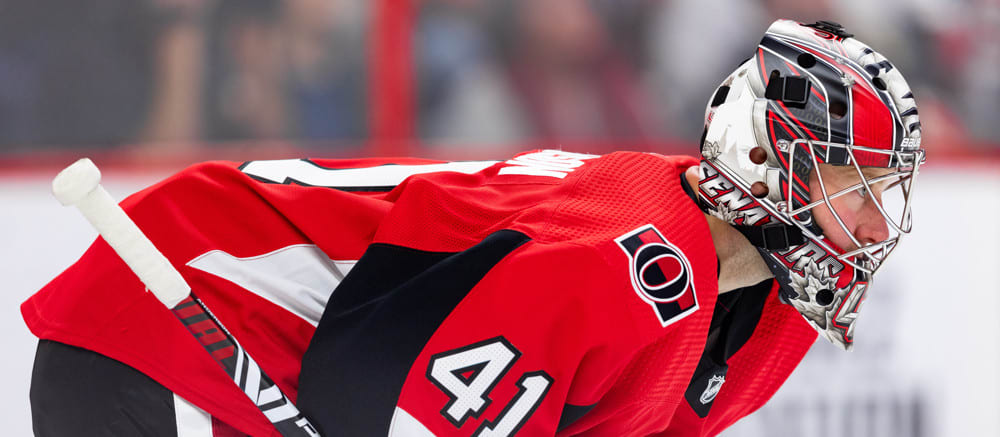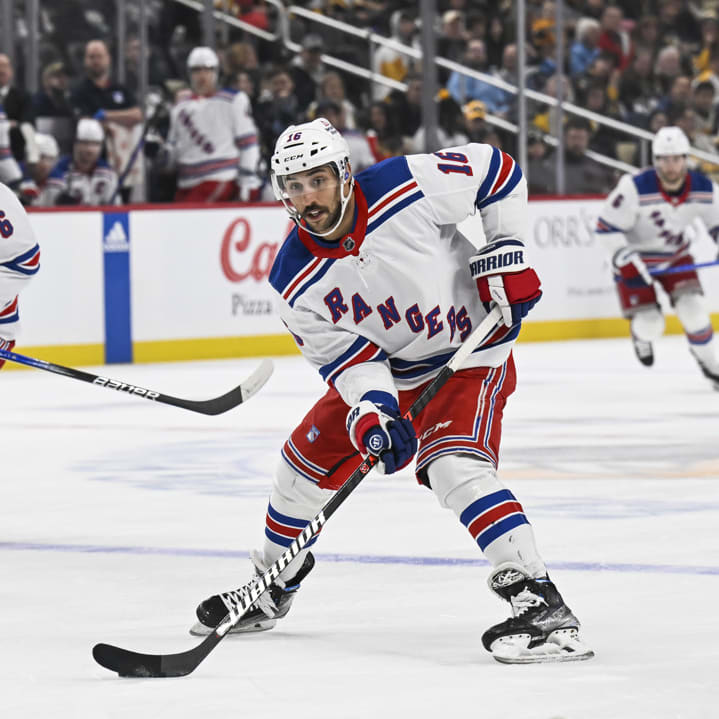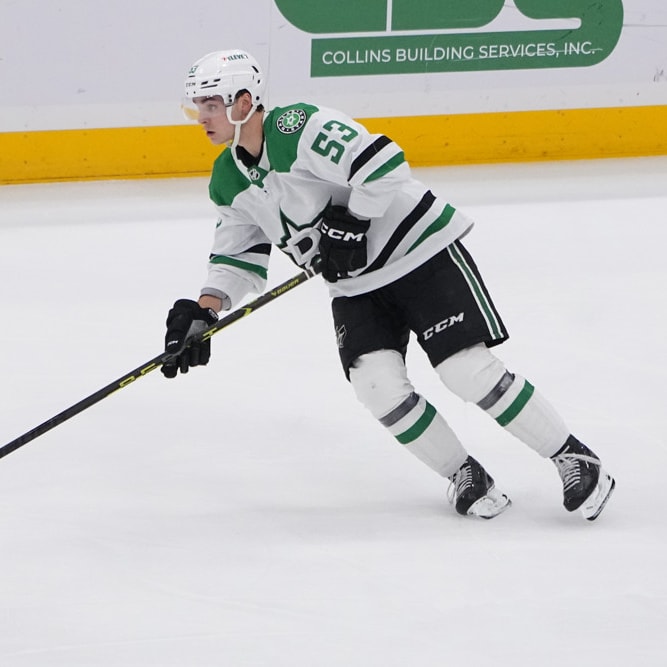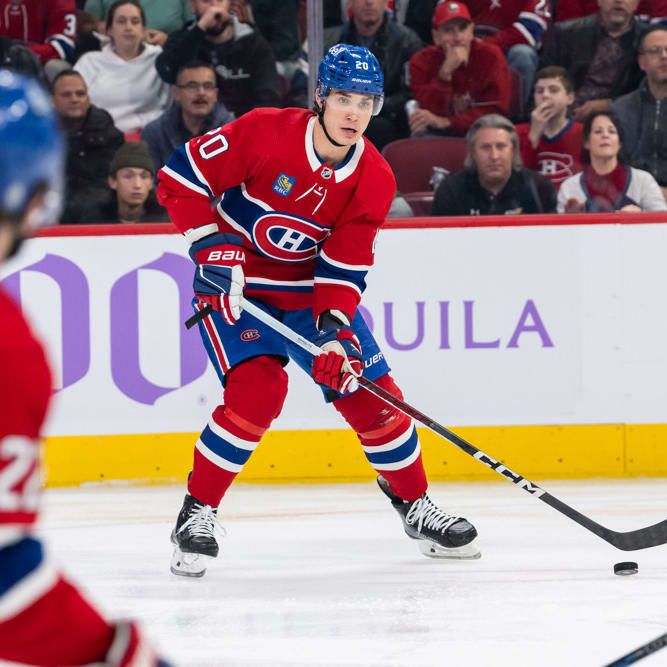This article is part of our Cap Compliance series.
While the current season remains on hiatus, there is no time like the present to start looking ahead to next year. Over the next several weeks, we'll take a look at the cap situation for all 31 NHL clubs, including restricted free agents, unrestricted free agents and even potential buyouts. Then, we'll play a little armchair General Manager by providing our recommendations for how we would approach the upcoming 2020-21 campaign if we were running the club.
In our most recent Twitter poll, the  Ottawa Senators grabbed third place and will round out the week.
Ottawa Senators grabbed third place and will round out the week.
2020-21 Cap Situation
The Senators currently have five forwards, four defensemen and two goaltenders under contract for next season at a price tag of $40,550,000, though that includes $4.875 million for Marian Gaborik which can be recouped via long-term injured reserve. The club also remains on the hook for $1,354,167 of Dion Phaneuf's buyout. Assuming a flat cap of $81.5 million, this leaves the club with $39,595,833 in cap space and 13 spots under the 23-man roster to fill.
Restricted Free Agents
Chris Tierney ($2.9 million) Connor Brown ($2.1 million) Anthony Duclair ($1.65 million) Jayce Hawryluk ($874,125) Rudolfs Balcers ($759,167) Nick Paul ($750,000) Andreas Englund ($700,000)
AJ Scholz: While Hawryluk, Balcers, Paul and Englund have all logged some NHL games, none of them has impressed enough to warrant anything more than a qualifying offer. If there is one that could be worthy of a one-way deal, it would be Paul who notched 20 points in 56 games this season. A two-year, $1.8 million deal would give the 25-year-old forward a bump in pay while also securing him to a longer-term contract. Since joining the Senators during the 2018-19 campaign, Duclair has registered 31 goals and 23 helpers in 87 games and seems to be having the most success of his career in Ottawa. At just 24 years of age, the club could consider giving him a four-year deal to extend some extra term while locking him in at $3.25 million AAV, which would put him in the range of the deal Alex Kerfoot signed with Toronto in July of 2019. Brown's numbers over his career, 124 points in 324 games, are similar to that of Duclair, so he'd probably end up in that same four-year, $14 million range. Like Duclair and Brown, Tierney is a valuable second-to-third line player, so he's worth keeping around as well. The fact that he has two seasons in which he's hit the 40-point mark, and the fact that he likely would have this year as well, means the 25-year-old figures to take home the largest salary of the three. He could command a five-year, $20 million contract or even push for slightly beyond the $4 million AAV.
Kyle Riley: Tierney is a solid middle-six option for the Senators and he's been a consistent 40-plus point producer since entering that role with the Sharks in 2017-18, and Ottawa has cap space to burn, so he's definitely worth keeping around on a multi-year deal with a bit of a raise. I think AJ's pretty spot on with the AAV here, a three-year, $12 million deal should get it done. Brown had his best season yet with the Senators this year after three full campaigns with the Maple Leafs during which he generally occupied a middle-six role. His increase in production can, however, largely be attributed to Ottawa's lack of talent up front leading to bonafide top-six minutes for the 26-year-old winger. The Sens have a few wingers in their system that should be ready for full-time roles with the big club next year, including Drake Batherson and Alex Formenton, so I don't think they should hand Brown much in terms of term, but I still think he's worth keeping around on something like a two-year, $6 million contract. Duclair has been highly inconsistent throughout the first six years of his career, which has led to him suiting up for five different organizations over that span while also seemingly butting heads with several of his head coaches along the way. As such, I think the Senators would be wise to play it safe and hand him a one-year, $2.5 million "prove-it" deal. He'll still be an RFA after next season, so if he performs well again, the organization can reevaluate whether he's worth a long-term deal with the benefit of a larger sample size. As AJ alluded to, nobody in the rest of this group (Hawryluk, Balcers, Paul, Englund) has really done anything of note in the NHL to date, so the QO should get it done for all four players. Paul was decent in a bottom-six role with the big club this season, but he isn't arbitration eligible, so he doesn't really have a leg to stand on.
Unrestricted Free Agents
Mikkel Boedker ($4 million) Matthew Peca ($1.3 million) Scott Sabourin ($700,000) Ron Hainsey ($3.5 million) Craig Anderson ($4.75 million) Mark Borowiecki ($1.2 million) Ryan Callahan ($5.8 million) Clarke MacArthur ($4.65 million)
AJ Scholz: Callahan and MacArthur have retired if not officially due to medical reasons, so neither will be back in action next season and their contracts will come off the books. The other question is whether the veteran Hainsey wants to continue playing into his 40s. Considering the team is expected to be closer to the cap floor than the ceiling, it could certainly consider offering the blueliner another one-year deal; however, would he even want to come back to a team that's not going to compete for anything? With the emergence of Anders Nilsson and the ongoing development of Marcus Hogberg, it appears that Anderson will be looking for a new home if he also wants to continue to play beyond this year. Boedker has already agreed to terms on a one-year deal with NLA club HC Lugano, so he'll be playing overseas next year. That just leaves Peca and Sabourin, both of whom dealt with injuries this year and struggled to get into the lineup. If the Senators were going to actually compete in 2020-21, I'd suggest they let these two hit the free-agent market, but if the club can get them signed with relatively minimal raises on one-year deals, it will help bolster its depth. On the blue line, Borowiecki's retention will depend on how team brass feel about the development of Erik Brannstrom, Max Lajoie and Christian Jaros to name a few. It might be better for the development of its young prospect for the organization to allow Borowiecki to walk.
Kyle Riley: As AJ mentioned, Callahan and MacArthur have retired due to career-ending injuries and Boedker will be playing overseas next year, so that takes care of that. Peca only appeared in 14 top-level games this season, so if he's willing to take a two-way deal to stick around, cool, if not, sayonara. Sabourin was essentially just deployed as an enforcer this season, picking up six points and 33 PIM while averaging just 7:01 minutes of ice time in 35 appearances. Ottawa gave him his first shot in the Show this year, and I doubt he'll get any looks at the NHL level elsewhere, so he should be willing to re-sign on another cheap, one-year, two-way deal. Hainsey's been in the league since 2005 (!), so if he wants to keep playing, I'm sure the Sens would love to keep him around as a great veteran presence for their youthful D corps. It'd be an overpay, but he could be a potential trade deadline target for contenders, so I wouldn't mind matching his deal from last year (one-year, $3.5 million) to keep him around. Anders Nilsson and Marcus Hogberg project to be the one-two punch for the Senators next year, and I'm sure Anderson would probably like to compete for a cup, even in a backup role, before he retires, so I see the two parties parting ways this offseason. Borowiecki is still a solid bottom-pairing option when he's healthy, but he's been plagued by injuries over the past three seasons. Nonetheless, if he's willing to sign a one-year deal, he's worth keeping around at a $1.5 million AAV.
Minor-League Free Agents *Who appeared in an NHL game in 2019-20
Jordan Szwarz ($800,000) Jean-Christophe Beaudin ($765,000) Filip Chlapik ($728,333) Christian Jaros ($755,000)
AJ Scholz: Szwarz put together a solid campaign in the minors this season with 18 goals and 18 assists in 46 appearances for AHL Belleville. That should be enough to earn himself another two-way deal in the neighborhood of $850,000. Beaudin and Jaros figure to be handed their qualifying offers, while Chlapik, the 2015 second-round pick, could be in line for a one-way deal. He's likely to be part of the core of this club moving forward, so a two-year, $1.5 million contract will show some commitment from the club while also retaining is RFA status at the end.
Kyle Riley: Szwarz is 29 years old and nothing more than a decent AHLer, so he won't get anything more than a one-year, two-way deal with a slight raise. Beaudin, Chlapik and Jaros have all had highly underwhelming starts to their professional careers. Jaros is the only one of the three that's arbitration eligible, but he only appeared in 13 games with the big club this campaign after logging 61 appearances with the Sens in 2017-18. In other words, the QO should get it done for all three.
Final Thoughts
AJ Scholz: The Senators aren't going to be pushing up against the cap, that much has been made clear by the organization heading into next season, or perhaps even beyond that. Unless they sign some free agents, or drastically overpay some of their current players, the team may need to even consider not putting Marian Gaborik's contract on LTIR in order to make sure it is reaching the salary floor. I think it would be beneficial for the team to not bring in a lot of guys in order to give some of these youngsters coming up the ranks the opportunity to sink or swim at the NHL level. It's going to be another rough campaign for the Sens' faithful, though the team could be bolstered by the chance of getting the No. 1 and No. 2 picks in the 2020 NHL Draft. Even if they don't win the Alexis Lafreniere lottery, the team has seven picks in the first two rounds next year and could build out the roster through the draft.
Kyle Riley: The Sens are still in the beginning stages of a total rebuild, so for now their focus should remain on signing a few players on expiring contracts (Tierney, Brown, Duclair, Sabourin, Hainsey, etc.) to shorter-term deals to reach the cap floor while continuing to develop their plethora of young talent. If they're still in need of some cash on the books to reach the floor, they'll be a prime candidate to pick up another LTIR contract from a contender in exchange for picks/prospects next year.












